Unit4 Don't eat in class Section A(Grammar Focus)第2课时课件22张
文档属性
| 名称 | Unit4 Don't eat in class Section A(Grammar Focus)第2课时课件22张 | 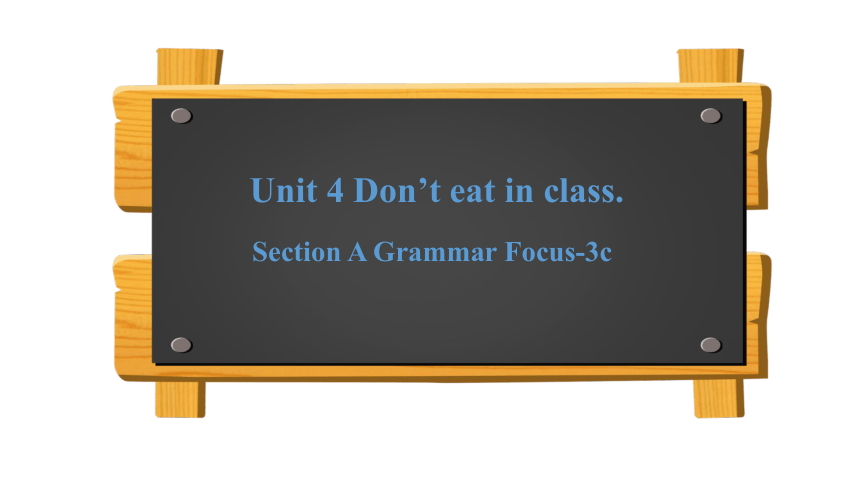 | |
| 格式 | pptx | ||
| 文件大小 | 3.1MB | ||
| 资源类型 | 教案 | ||
| 版本资源 | 人教新目标(Go for it)版 | ||
| 科目 | 英语 | ||
| 更新时间 | 2022-03-23 09:37:57 | ||
图片预览

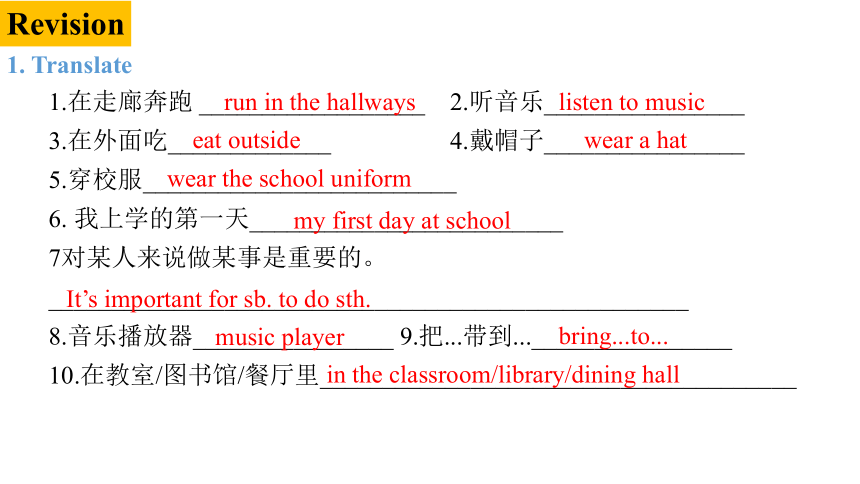
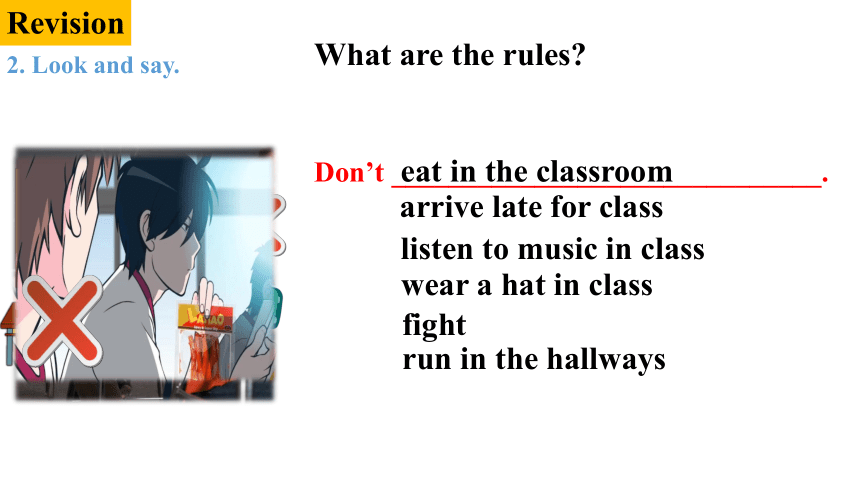
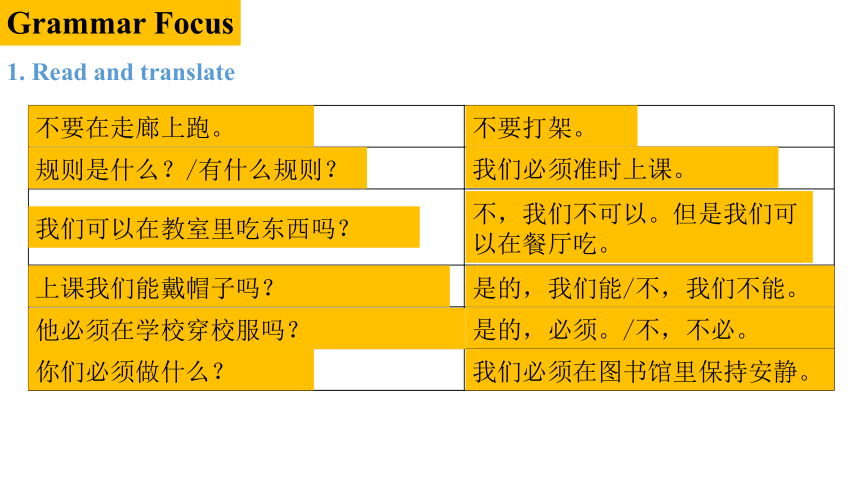




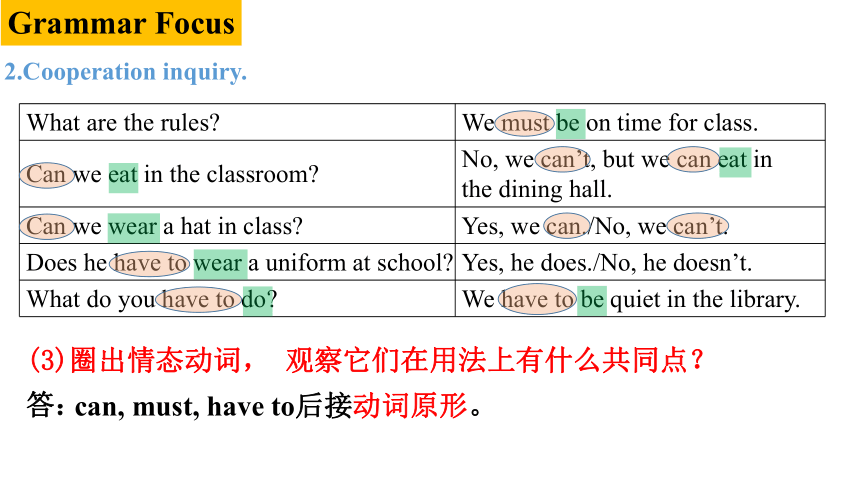
文档简介
(共22张PPT)
Unit 4 Don’t eat in class.
Section A Grammar Focus-3c
Revision
1.在走廊奔跑 __________________ 2.听音乐________________
3.在外面吃_____________ 4.戴帽子________________
5.穿校服_________________________
6. 我上学的第一天_________________________
7对某人来说做某事是重要的。___________________________________________________
8.音乐播放器________________ 9.把...带到...________________
10.在教室/图书馆/餐厅里______________________________________
in the classroom/library/dining hall
music player
run in the hallways
It’s important for sb. to do sth.
eat outside
wear the school uniform
bring...to...
wear a hat
listen to music
my first day at school
1. Translate
Don’t ______________________________.
Revision
2. Look and say.
listen to music in class
What are the rules
run in the hallways
wear a hat in class
eat in the classroom
fight
arrive late for class
Grammar Focus
Don’t run in the hallways. Don’t fight.
What are the rules We must be on time for class.
Can we eat in the classroom No, we can’t, but we can eat in
the dining hall.
Can we wear a hat in class Yes, we can./No, we can’t.
Does he have to wear a uniform at school Yes, he does./No, he doesn’t.
What do you have to do We have to be quiet in the library.
1. Read and translate
不要在走廊上跑。
不要打架。
不,我们不可以。但是我们可以在餐厅吃。
是的,我们能/不,我们不能。
我们必须准时上课。
我们可以在教室里吃东西吗?
上课我们能戴帽子吗?
他必须在学校穿校服吗?
你们必须做什么?
我们必须在图书馆里保持安静。
规则是什么?/有什么规则?
是的,必须。/不,不必。
祈使句的否定句怎样构成?肯定句呢?一般在什么情况下会用祈使句?
情态动词在用法上有什么共同点?
can在本单元主要表示什么含义?它还可表达什么意思?
have to在句法上与其他情态动词有何区别?
2.Cooperation inquiry.
Grammar Focus
(1)以上两个句子为祈使句的否定句。即在动词原形前加don’t,表示“不要做什么事”。
Don’t run in the hallways. Don’t fight.
2.Cooperation inquiry.
Grammar Focus
祈使句一般用来表示______ 、_______、________、______和______等。在祈使句中,通常省略主语_____,其肯定形式以__________开头,否定形式是在动词原形前加______。祈使句句尾用句号或感叹号,读时用降调。为表示_______,可以在句首或句尾加上_______。句末用please时,前面通常加_______。
请求
号召
警告
劝说
命令
you
动词原形
don’t
礼貌
please
逗号
(2)什么叫祈使句?(阅读P119)
Do型 动词原形(+宾语)+其他成分 Come here.
Stand up.
Wear the school uniform on weekdays, please.
Be型 Be+表语(名词或形容词)+其他 Be a good child.
Be quiet.
Let型 Let+宾语+动词原形+其他成分 Let me help you.
Let’s go !
肯定祈使句的类型
到这儿来。
起立!
上学日请穿校服。
安静。
要做一个好孩子。
让我来帮助你。
咱们走吧!
Do型 Don’t +肯定祈使句 Don’t sit here.
Don’t eat in the classroom.
Don’t watch TV before dinner.
Be型 Don’t +肯定祈使句 Don’t be late fir school.
Let型 Don’t +肯定祈使句 Don’t let him go.
Let +宾语+not +动词原形+ ... Let him not go.
No型 No +名词/动词 ing 表示禁止或规劝,常用于公共场所。 No photos!
No smoking!
No fishing!
否定祈使句的类型
晚饭前不要看电视。
不要在教室里吃东西。
不要坐在这儿。
上学别迟到。
不要让他走。
不要让他走。
禁止拍照!
禁止吸烟!
禁止钓鱼!
2.Cooperation inquiry.
Grammar Focus
What are the rules We must be on time for class.
Can we eat in the classroom No, we can’t, but we can eat in
the dining hall.
Can we wear a hat in class Yes, we can./No, we can’t.
Does he have to wear a uniform at school Yes, he does./No, he doesn’t.
What do you have to do We have to be quiet in the library.
(3)圈出情态动词, 观察它们在用法上有什么共同点?
答:
can, must, have to后接动词原形。
2.Cooperation inquiry.
Grammar Focus
Can we eat in the classroom No, we can’t, but we can eat in
the dining hall.
Can we wear a hat in class Yes, we can./No, we can’t.
(4)can在本单元主要表示什么含义?它还可表达什么意思?
答:
can的意思是“能够;允许、许可”, 还可表示“能力” 。
Can we ...... 该句式用于询问是否许可或征求对方同意。
2.Cooperation inquiry.
Grammar Focus
Does he have to wear a uniform at school Yes, he does./No, he doesn’t.
What do you have to do We have to be quiet in the library.
(4)have to在句法上与其他情态动词有何区别?
答:
have to有人称和数的变化。
Don’t run in the hallways. Don’t fight.
What are the rules We must be on time for class.
Can we eat in the classroom No, we can’t, but we can eat in the dining hall.
Can we wear a hat in class Yes, we can./No, we can’t.
Does he have to wear a uniform at school Yes, he does./No, he doesn’t.
What do you have to do We have to be quiet in the library.
Grammar Focus
3.can 在本单元主要表示什么含义?它还可以表达什么意思?
4.have to 在句法上和其他情态动词的区别在哪里?
2.Cooperation inquiry.
Grammar Focus
must (情态动词) have to (动词短语)
含义 “必须、一定”,表示因主观需要或责任感的驱使而有必要或义务去做某事;也可表示命令、愿望 must +动词原形 I must go now. “不得不;必须”,强调客观因素影响而不得不做某事,跟主观意愿无关
have to +动词原形
It’s too late. I have to take a taxi.
时态 一般只表现在,无人称和数的变化 例: I/He/We must work. 可用于不同时态,有人称和数的变化(have to→has to) He has to wear a jacket.
否定 “mustn’t ” 不准、禁止 You mustn’t swim in the river. 借助助动词do/ does
“don’t/doesn’t have to” 不必、不需要
You don’t have to get up early.
疑问 以must开头的一般疑问句, 肯定回答:用must 否定回答:用needn’t/ don’t have to (不需要,不必) 例: - Must I go now - Yes, you must. - No, you needn’t.(No,you don’t have to. ) 借助助动词do/ does
肯定句:I have to go home.
一般疑问句:Do you have to go home Yes,I do. No,I don’t.
太晚了,我必须乘出租车。
我必须现在就走。
你不需要早起。
你们不准在河里游泳。
他不得不穿一件夹克衫。
Look at the pictures. Do you know the meaning of these signs
Practice
1
2
3
4
We can’t eat or drink .
We can’t talk.
We can’t take photos.
We can’t listen to music.
3a
Write the rules for the school library.
3a
Library Rules
1. ____________________________
2. ____________________________
3. ____________________________
4. ____________________________
Don’t talk.
1
2
3
4
Practice
Don’t eat in the library.
Don’t listen to music in the library.
Don’t take photos in the library.
Q:__________________________________ (he/have to/in the dining hall)
A:__________________________________
Use the words to make questions about the rules. Then write answers according to your school.
Q: Does she have to be quiet in the library (she/have to/in the library)
A: Yes, she does.
Be quiet
3b
Does he have to eat in the dinning hall
Yes, he does.
Eat
Practice
Q:_________________________________(we/can/in the hallways)
A:_________________________________
Listen to music
Can we listen to music in the hallways
No, we can’t.
Wear a hat
Q:_________________________________(we/can/in the classroom)
A:_________________________________
Can we wear a hat in the classroom
No, we can’t.
Practice
Make up five cool rules for your dream school. Share your rules with the class. Your classmates vote for the Coolest School!
3c
1.We can eat in class.
2.We don’t have to come to school every day.
3. ...
Practice
Report: At my dream school, we don’t have to come to school every day. We can eat in class,We don’t have to come to school every day......
Exercises
一、默写单词。
1. (n.)规则;规章_________ 2.(v.)到达_______ 3.准时____________
4. (n.)走廊;过道_________ 5. (n.)大厅;礼堂___________
6. (n.)餐厅___________ 7.(v.)听;倾听_________
8.听...______________ 9.(v.&n.)打架;战斗_________
10.(adj.)抱歉的;难过的;惋惜的______
11.(adv.)在外面;(adj.)外面的____________ 12.(v.)穿;戴________
13.(adj.)重要的___________ 13.(v.)带来;取来____________
14.必须;不得不__________ 15. (n.)校服;制服_____________
16.(adj.)安静的__________
rule
arrive
(be) on time
hallway
hall
dining hall
listen
listen to
fight
sorry
outside
wear
important
bring
have to
uniform
quiet
Exercises
二、根据汉语意思完成句子。
1.不要在教室里跑。
Don’t run ______ ______ ___________.
2.放学后我们能到外面玩吗?
________ we ______ _______ after school
3.我们总是得穿校服并保持教师安静。
We always have to ________ school uniforms and ______ _______ in the classroom.
4.上学的晚上我们不应该看电视。
We shouldn’t watch TV _____ ______ ________.
5.我们可以在食堂吃饭。
We ________ eat in the school ________ _______.
in the classroom
Can play outside
wear keep quiet
on school nights
can dining hall
Exercises
6.我们上课不能迟到,我们必须准时。
We can’t ______ ______ _______ class. We must ______ ______ ______.
7.对不起,我不能把CD播放器带到教室里。
I’m ________ ,I can’t _______ my CD player ______ the classroom.
8.---他晚上必须做作业吗?---是的。
--- _____ he _______ ______ do his homework at night
---Yes, he _______.
9.我们能在教室里听音乐吗?
______ we ________ _______ music in the classroom
10.我们上课可以戴帽子吗?
________ we ______ a hat in class
11.对我们来说吃大量的水果和蔬菜很重要。
It’s ____________ for us ______ eat lots of fruit and vegetables.
arrive late for
sorry bring to
be on time
Does have to
does
Can listen to
Can wear
improtant to
Homework
1. You must : Remember the sentences in the Grammar Focus.
2. If you can: Write five rules for your family.
Unit 4 Don’t eat in class.
Section A Grammar Focus-3c
Revision
1.在走廊奔跑 __________________ 2.听音乐________________
3.在外面吃_____________ 4.戴帽子________________
5.穿校服_________________________
6. 我上学的第一天_________________________
7对某人来说做某事是重要的。___________________________________________________
8.音乐播放器________________ 9.把...带到...________________
10.在教室/图书馆/餐厅里______________________________________
in the classroom/library/dining hall
music player
run in the hallways
It’s important for sb. to do sth.
eat outside
wear the school uniform
bring...to...
wear a hat
listen to music
my first day at school
1. Translate
Don’t ______________________________.
Revision
2. Look and say.
listen to music in class
What are the rules
run in the hallways
wear a hat in class
eat in the classroom
fight
arrive late for class
Grammar Focus
Don’t run in the hallways. Don’t fight.
What are the rules We must be on time for class.
Can we eat in the classroom No, we can’t, but we can eat in
the dining hall.
Can we wear a hat in class Yes, we can./No, we can’t.
Does he have to wear a uniform at school Yes, he does./No, he doesn’t.
What do you have to do We have to be quiet in the library.
1. Read and translate
不要在走廊上跑。
不要打架。
不,我们不可以。但是我们可以在餐厅吃。
是的,我们能/不,我们不能。
我们必须准时上课。
我们可以在教室里吃东西吗?
上课我们能戴帽子吗?
他必须在学校穿校服吗?
你们必须做什么?
我们必须在图书馆里保持安静。
规则是什么?/有什么规则?
是的,必须。/不,不必。
祈使句的否定句怎样构成?肯定句呢?一般在什么情况下会用祈使句?
情态动词在用法上有什么共同点?
can在本单元主要表示什么含义?它还可表达什么意思?
have to在句法上与其他情态动词有何区别?
2.Cooperation inquiry.
Grammar Focus
(1)以上两个句子为祈使句的否定句。即在动词原形前加don’t,表示“不要做什么事”。
Don’t run in the hallways. Don’t fight.
2.Cooperation inquiry.
Grammar Focus
祈使句一般用来表示______ 、_______、________、______和______等。在祈使句中,通常省略主语_____,其肯定形式以__________开头,否定形式是在动词原形前加______。祈使句句尾用句号或感叹号,读时用降调。为表示_______,可以在句首或句尾加上_______。句末用please时,前面通常加_______。
请求
号召
警告
劝说
命令
you
动词原形
don’t
礼貌
please
逗号
(2)什么叫祈使句?(阅读P119)
Do型 动词原形(+宾语)+其他成分 Come here.
Stand up.
Wear the school uniform on weekdays, please.
Be型 Be+表语(名词或形容词)+其他 Be a good child.
Be quiet.
Let型 Let+宾语+动词原形+其他成分 Let me help you.
Let’s go !
肯定祈使句的类型
到这儿来。
起立!
上学日请穿校服。
安静。
要做一个好孩子。
让我来帮助你。
咱们走吧!
Do型 Don’t +肯定祈使句 Don’t sit here.
Don’t eat in the classroom.
Don’t watch TV before dinner.
Be型 Don’t +肯定祈使句 Don’t be late fir school.
Let型 Don’t +肯定祈使句 Don’t let him go.
Let +宾语+not +动词原形+ ... Let him not go.
No型 No +名词/动词 ing 表示禁止或规劝,常用于公共场所。 No photos!
No smoking!
No fishing!
否定祈使句的类型
晚饭前不要看电视。
不要在教室里吃东西。
不要坐在这儿。
上学别迟到。
不要让他走。
不要让他走。
禁止拍照!
禁止吸烟!
禁止钓鱼!
2.Cooperation inquiry.
Grammar Focus
What are the rules We must be on time for class.
Can we eat in the classroom No, we can’t, but we can eat in
the dining hall.
Can we wear a hat in class Yes, we can./No, we can’t.
Does he have to wear a uniform at school Yes, he does./No, he doesn’t.
What do you have to do We have to be quiet in the library.
(3)圈出情态动词, 观察它们在用法上有什么共同点?
答:
can, must, have to后接动词原形。
2.Cooperation inquiry.
Grammar Focus
Can we eat in the classroom No, we can’t, but we can eat in
the dining hall.
Can we wear a hat in class Yes, we can./No, we can’t.
(4)can在本单元主要表示什么含义?它还可表达什么意思?
答:
can的意思是“能够;允许、许可”, 还可表示“能力” 。
Can we ...... 该句式用于询问是否许可或征求对方同意。
2.Cooperation inquiry.
Grammar Focus
Does he have to wear a uniform at school Yes, he does./No, he doesn’t.
What do you have to do We have to be quiet in the library.
(4)have to在句法上与其他情态动词有何区别?
答:
have to有人称和数的变化。
Don’t run in the hallways. Don’t fight.
What are the rules We must be on time for class.
Can we eat in the classroom No, we can’t, but we can eat in the dining hall.
Can we wear a hat in class Yes, we can./No, we can’t.
Does he have to wear a uniform at school Yes, he does./No, he doesn’t.
What do you have to do We have to be quiet in the library.
Grammar Focus
3.can 在本单元主要表示什么含义?它还可以表达什么意思?
4.have to 在句法上和其他情态动词的区别在哪里?
2.Cooperation inquiry.
Grammar Focus
must (情态动词) have to (动词短语)
含义 “必须、一定”,表示因主观需要或责任感的驱使而有必要或义务去做某事;也可表示命令、愿望 must +动词原形 I must go now. “不得不;必须”,强调客观因素影响而不得不做某事,跟主观意愿无关
have to +动词原形
It’s too late. I have to take a taxi.
时态 一般只表现在,无人称和数的变化 例: I/He/We must work. 可用于不同时态,有人称和数的变化(have to→has to) He has to wear a jacket.
否定 “mustn’t ” 不准、禁止 You mustn’t swim in the river. 借助助动词do/ does
“don’t/doesn’t have to” 不必、不需要
You don’t have to get up early.
疑问 以must开头的一般疑问句, 肯定回答:用must 否定回答:用needn’t/ don’t have to (不需要,不必) 例: - Must I go now - Yes, you must. - No, you needn’t.(No,you don’t have to. ) 借助助动词do/ does
肯定句:I have to go home.
一般疑问句:Do you have to go home Yes,I do. No,I don’t.
太晚了,我必须乘出租车。
我必须现在就走。
你不需要早起。
你们不准在河里游泳。
他不得不穿一件夹克衫。
Look at the pictures. Do you know the meaning of these signs
Practice
1
2
3
4
We can’t eat or drink .
We can’t talk.
We can’t take photos.
We can’t listen to music.
3a
Write the rules for the school library.
3a
Library Rules
1. ____________________________
2. ____________________________
3. ____________________________
4. ____________________________
Don’t talk.
1
2
3
4
Practice
Don’t eat in the library.
Don’t listen to music in the library.
Don’t take photos in the library.
Q:__________________________________ (he/have to/in the dining hall)
A:__________________________________
Use the words to make questions about the rules. Then write answers according to your school.
Q: Does she have to be quiet in the library (she/have to/in the library)
A: Yes, she does.
Be quiet
3b
Does he have to eat in the dinning hall
Yes, he does.
Eat
Practice
Q:_________________________________(we/can/in the hallways)
A:_________________________________
Listen to music
Can we listen to music in the hallways
No, we can’t.
Wear a hat
Q:_________________________________(we/can/in the classroom)
A:_________________________________
Can we wear a hat in the classroom
No, we can’t.
Practice
Make up five cool rules for your dream school. Share your rules with the class. Your classmates vote for the Coolest School!
3c
1.We can eat in class.
2.We don’t have to come to school every day.
3. ...
Practice
Report: At my dream school, we don’t have to come to school every day. We can eat in class,We don’t have to come to school every day......
Exercises
一、默写单词。
1. (n.)规则;规章_________ 2.(v.)到达_______ 3.准时____________
4. (n.)走廊;过道_________ 5. (n.)大厅;礼堂___________
6. (n.)餐厅___________ 7.(v.)听;倾听_________
8.听...______________ 9.(v.&n.)打架;战斗_________
10.(adj.)抱歉的;难过的;惋惜的______
11.(adv.)在外面;(adj.)外面的____________ 12.(v.)穿;戴________
13.(adj.)重要的___________ 13.(v.)带来;取来____________
14.必须;不得不__________ 15. (n.)校服;制服_____________
16.(adj.)安静的__________
rule
arrive
(be) on time
hallway
hall
dining hall
listen
listen to
fight
sorry
outside
wear
important
bring
have to
uniform
quiet
Exercises
二、根据汉语意思完成句子。
1.不要在教室里跑。
Don’t run ______ ______ ___________.
2.放学后我们能到外面玩吗?
________ we ______ _______ after school
3.我们总是得穿校服并保持教师安静。
We always have to ________ school uniforms and ______ _______ in the classroom.
4.上学的晚上我们不应该看电视。
We shouldn’t watch TV _____ ______ ________.
5.我们可以在食堂吃饭。
We ________ eat in the school ________ _______.
in the classroom
Can play outside
wear keep quiet
on school nights
can dining hall
Exercises
6.我们上课不能迟到,我们必须准时。
We can’t ______ ______ _______ class. We must ______ ______ ______.
7.对不起,我不能把CD播放器带到教室里。
I’m ________ ,I can’t _______ my CD player ______ the classroom.
8.---他晚上必须做作业吗?---是的。
--- _____ he _______ ______ do his homework at night
---Yes, he _______.
9.我们能在教室里听音乐吗?
______ we ________ _______ music in the classroom
10.我们上课可以戴帽子吗?
________ we ______ a hat in class
11.对我们来说吃大量的水果和蔬菜很重要。
It’s ____________ for us ______ eat lots of fruit and vegetables.
arrive late for
sorry bring to
be on time
Does have to
does
Can listen to
Can wear
improtant to
Homework
1. You must : Remember the sentences in the Grammar Focus.
2. If you can: Write five rules for your family.
同课章节目录
- Unit 1 Can you play the guitar?
- Section A
- Section B
- Unit 2 What time do you go to school?
- Section A
- Section B
- Unit 3 How do you get to school?
- Section A
- Section B
- Unit 4 Don't eat in class.
- Section A
- Section B
- Unit 5 Why do you like pandas?
- Section A
- Section B
- Unit 6 I'm watching TV.
- Section A
- Section B
- Review of Units 1-6
- Unit 7 It's raining!
- Section A
- Section B
- Unit 8 Is there a post office near here?
- Section A
- Section B
- Unit 9 What does he look like?
- Section A
- Section B
- Unit 10 I'd like some noodles.
- Section A
- Section B
- Unit 11 How was your school trip?
- Section A
- Section B
- Unit 12 What did you do last weekend?
- Section A
- Section B
